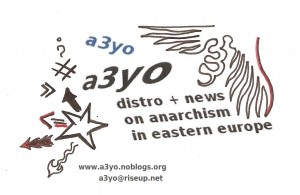I followed the campaign about the prisoners in belgrade from the beginning, after i heard there had been arrests in belgrade and one of them is ratibor.
i do not agree with some of his positions (which are probably positions of other people in the group as well) and i have also some critics on ASI statement (see: http://asi.zsp.net.pl/political-arrests-in-belgrade/asi-statement/ ). But for me two things are very important. One is that ratibor is a friend of mine for years and i am really pissed of the imagination that he and the others are sitting in prison. (as i am with other people sitting in prison as well, but especially if i am personal attached) the second thing is: to give a fine of "international terrorism" for property damage at an embassy, no matter if they are guilty or not (i really think this is not important for the discussion at all) is just not acceptable for anyone who is not completly authoritarian.
I do not live in serbia, i was just visiting it from time to time. But i think it is important to make public that this courtcases are not only results of that these people are anarchosyndicalists or because of property damage after an arson attack against a embassy was taking place. It is like in every courtcase about control, about disciplining and probably as i experienced the serbian government about showing in a traditional authoritarian style, what they are able to do if any person is not following the mainstream-nationalist-religiouse attitude of "normality".
Prison system is as well much related to patriarchy, about showing people who is in power and who is able to define what is right and what is wrong. It is not long time ago this government and serbian society was in war. Ratibor was in prison once (for short time) when he publical announced that djindjic, who was killed in that time, was a neoliberal brutal capitalist politician like all the others, not a progressive heroe as some leftists wanted to state in that time. It is possible to have another opinion about this and say "better djindjic than more rightwing politicians", but the point is that naming politicians "criminals" was enough to be arrested in serbia some years ago. ( http://de.indymedia.org/2003/03/44618.shtml )
As for gaylesbian movement in serbia i experienced the last 7 years the strategy of the ones in power is "they do not exist in serbia" and homophobic "normality" is supported by media. So probably also anarchists and anarchosyndicalists and any subculture "do not exist in serbia". Of course, if politicians from outside, like european union member states are negotiating, gaylesbian rights are in theory respected since some years. But in fact the belgrade pride could not take place again this year, for "security reasons" ( http://eng.belgradepride.rs ). This is the same system that attacks "non-normal" and puts people easyly in prison, who do not fit in the obedient traditional serbian picture. War criminals are much less confronted with their actions in serbian publicity than some few anarchists who are accused to made a small property damage.
Another important topic is the revolte in greece. It is probable that other balkan countries could expect similair uprising tendencies like in greece. Not because of anarchist traditions, who are much weaker everywhere in europe expect greece and not in necessary similair direction. But in a economical and political way the region is not as stable as western countries are. The situation is pretty much fucked up for workers, students and all the people who are not benefiting from corruption and crisis as i hear for years from people who live there. In bulgaria for example the rightwing and fascists use this tendencies of socially destabilized society for their propaganda of anti-turkish and anti-roma politics. There were factory-occupations in serbia the last years, workers strikes and a lot of conflicts that are not necessary progressive. But uprising or any instabilization of the capitalist system frightens the ones in power. So it is clear that police and judges have a interest to punish direct action of any colour to keep the business running. So it is important to make people realize that nationalism and state-obedience are no solutions for ongoing crisis.
The anarchosyndicalists in practice and theory i do not have much connection with, because i am active in other groups in hamburg and i am just partly in syndicalist issues. I respect the aim of anarchosyndicalists but made the experience the last weeks that several people who are not organised like that tell me "ok, i heard about these anarchosyndicalists being arrested". This implies that people think it is "not their issue" but the one of anarchosyndicalists. This attitude is dangerouse but has to be broken as well from the solidarity campaign. This state attack is not only about anarchosyndicalism, but about confrontational resistance against violence of the state in the streets of greece and elsewhere.
For antirepression campaigns in germany we made the experience that "one is accused, all are targed" is an appropiate slogan to point out what repression of that kind is about. Prisoners solidarity is important to show because it is the system of prisons that is one of the strongest weapons of a society that blocks our aim for a world of dignity and global freedom. It is possible to criticize someones action and it is an interesting debate wether to free "all prisoners" or "all political prisoners" or "all anarchist prisoners" but the system behind and its prisons is the root of oppression to attack for anarchists and this has to be kept in mind.
Delete prison society - solidarity with the struggeling resistance against control society - fight law and order
a3yo, hamburg
www.a3yo.noblogs.org
more information about the case: http://asi.zsp.net.pl



